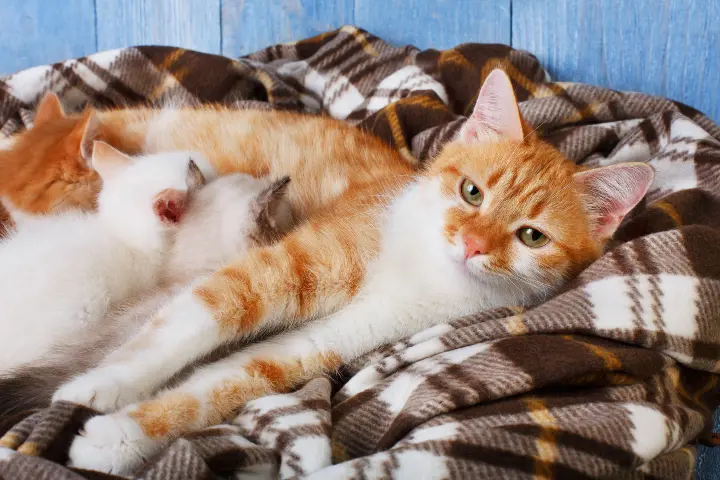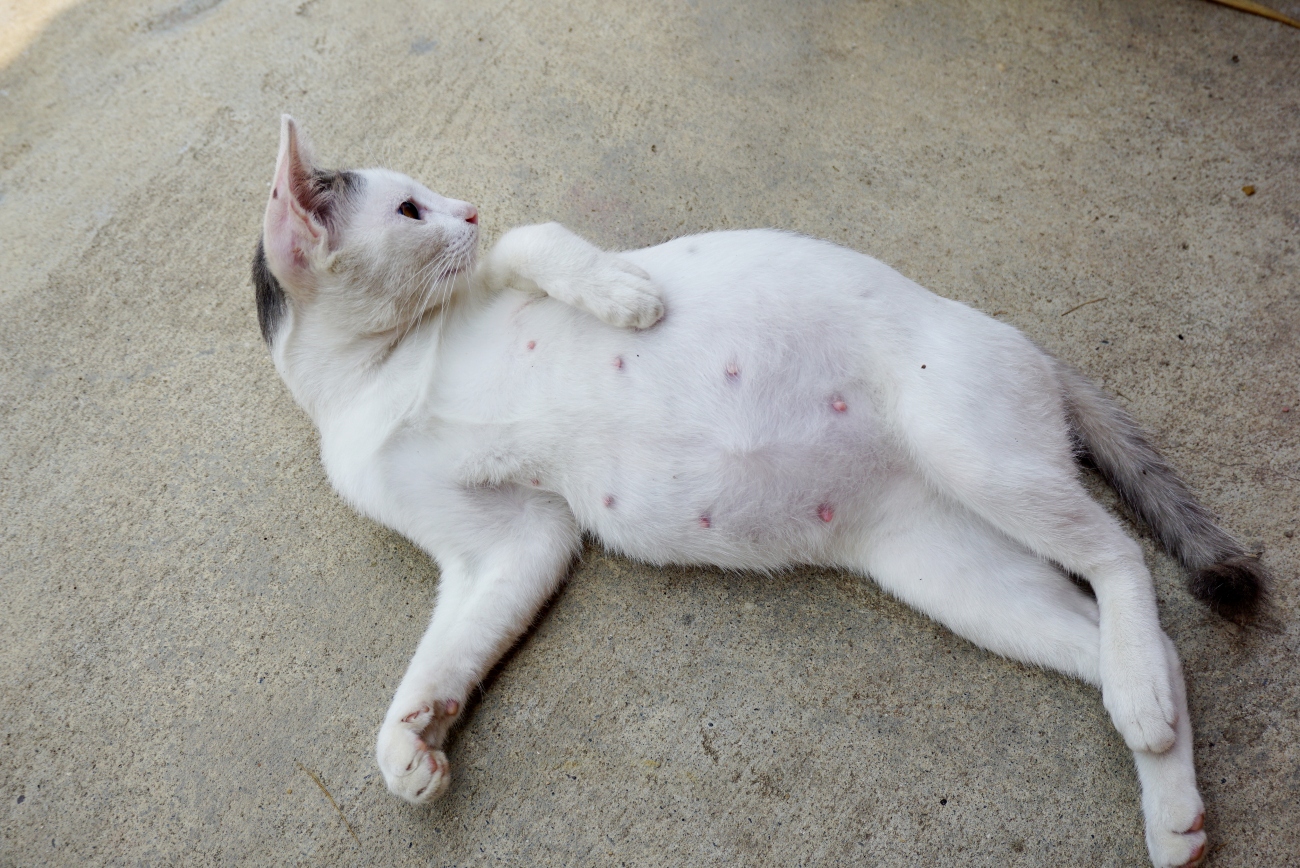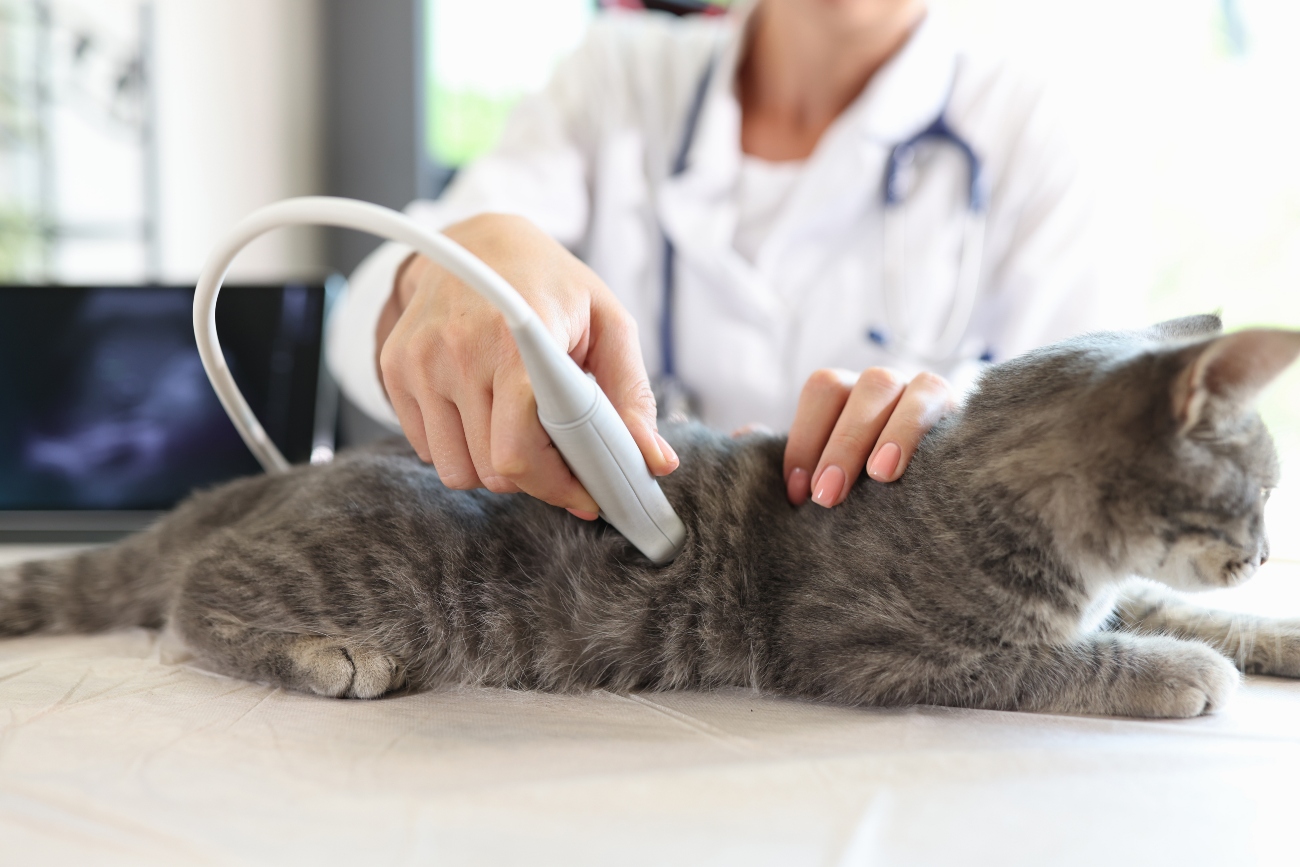How to tell if your nursing cat is pregnant again
10th November, 2023

As a cat owner, it's advised that you understand your cat's heat cycles, and that includes knowing how to tell if a nursing cat is pregnant again.
Cats are prolific breeders, and sometimes, they might become pregnant even while they're still nursing a litter of kittens. This can be a concern for cat owners who want to ensure the health and wellbeing of their nursing cat and her kittens.
In this comprehensive guide, we'll discuss the signs of a nursing cat's pregnancy, the risks of back-to-back pregnancies in cats, and how to prevent unwanted pregnancies in nursing cats.
For more information on pregnancy symptoms in cats, check out our article, how do I know if my cat is pregnant?
We'll also provide tips on preparing for new kittens and caring for the nursing cat, as well as when to consult a veterinarian.
Signs of a nursing cat's pregnancy
Identifying the signs of pregnancy in a nursing cat can be tricky, as some of the symptoms might be similar to those experienced by a cat that's not nursing.
However, there are specific physical and behavioural changes that may indicate pregnancy in a nursing cat.
Physical changes in a pregnant cat
When trying to determine if she's pregnant again, look for these physical changes in mother cats:
- Swollen belly: As the cat's pregnancy progresses, her belly will become noticeably larger. This can be more difficult to discern in a nursing cat, as she may already have a distended abdomen from nursing her kittens. However, if the enlargement seems to increase rapidly over a short period, this could be a sign of pregnancy.
- Enlarged nipples: A pregnant cat's nipples will be enlarged in preparation for the babies. While nursing, a cat's nipples will already be slightly larger than usual. Yet, if they continue to enlarge even after the kittens have started to wean, this could be an indication of a new pregnancy.
- Weight gain: A pregnant nursing cat may have noticeable weight gain, especially in the later stages of pregnancy. Keep an eye on her weight, and if you notice a significant increase even after accounting for the weight of the nursing kittens, this could be a sign of pregnancy.
Behavioural changes in a pregnant cat
In addition to physical changes, a cat's behaviour will change while she's pregnant, such as:
- Increased appetite: A female cat's appetite will already be higher than usual to provide enough nutrition for her kittens. However, if her appetite continues to increase even after the kittens begin to wean, this might be a sign that she's expecting again.
- Nesting behaviour: Pregnant cats will often start to exhibit nesting behaviours, such as seeking out a quiet place to prepare for the arrival of more kittens. If your nursing cat starts displaying these behaviours, it could be an indication that she's pregnant again.
- Decreased interest in nursing: As a cat's pregnancy progresses, she may become less interested in nursing her current litter. If you notice that your cat is spending less time with her kittens and nursing them less frequently, this might be a sign that she's expecting again.
How soon can a cat get pregnant again?
You may not realise but a cat can get pregnant again as soon as a few weeks after giving birth.
Therefore, it's important to have your cat spayed if you don't want her to have multiple litters in a short period of time. If you're unsure about when your cat can safely become pregnant again, it's best to consult with your vet who can provide tailored advice based on your cat's individual needs.
How long is a cat pregnant?
If you're a cat owner who recently found themselves with a pregnant cat, you may wonder how long is a cat pregnant?
Well, the answer is approximately 63-65 days or nine weeks.
However, it's important to note that this number can vary slightly depending on various factors such as breed, age, and health of the mother cat.
During pregnancy, cats require extra care and attention to ensure the health of both the mother and the developing kittens. Regular visits to the vet, proper nutrition, and a stress-free environment are crucial for a successful pregnancy.
How to confirm your nursing cat's pregnancy
If you suspect that your female cat is pregnant again, the best way to confirm her pregnancy is by consulting a vet.
Your vet can perform a physical examination, palpation, or ultrasound to determine if your cat is indeed pregnant.
Blood tests and X-ray are also options for confirming a cat's pregnancy, although these are typically used in later stages of pregnancy.
The risks of back-to-back pregnancies in cats

Back-to-back pregnancies can pose risks to both the mother cat and her kittens. Some potential risks include:
Nutritional deficiencies
A nursing cat that becomes pregnant again may struggle to provide adequate nutrition for both her current litter and the developing foetuses. This can lead to malnutrition, weight loss, and other health issues for the mother cat and her kittens.
Increased stress
Pregnant cats already face a certain amount of stress, and a female cat that becomes pregnant again will have even more to contend with. This added stress can have negative effects on both the cat's physical and mental health.
Reduced care for current litter
A pregnant nursing cat may not be able to provide the same level of care and attention to her current litter as she would if she were not pregnant.
This can result in less socialisation and a weaker bond between the mother and her kittens, which may lead to behavioural issues in the kittens as they grow up.
How to prevent unwanted pregnancies in nursing cats
To prevent unwanted pregnancies in nursing cats, consider the following steps:
Spaying
Spaying your cat is the most effective way to prevent unwanted pregnancies. According to the VCA animal hospital, they suggest that you should have your cat spayed before she goes into her first heat cycle.
If your cat is already nursing, consult your vet for advice on the best time to spay her.
Keep your cat indoors
If your nursing cat is not spayed, it's best to keep her indoors to reduce the chances of her encountering feline friends and becoming pregnant again. This is especially important during breeding season.
According to the RSPCA, breeding season typically occurs between April and September.
Monitor outdoor time
If you must let your female cat outside, make sure to supervise her at all times to prevent any unwanted encounters with male cats.
Preparing for new kittens and caring for the nursing cat
If your nursing cat is indeed pregnant again, it's essential to prepare for the arrival of the new kittens and ensure that the mum receives proper care. Some tips include:
Provide a comfortable nesting area
Set up a quiet and secluded spot for mum to give birth and care for her kittens. This can be a cardboard box or room in your home where you can start arranging blankets for after the birth.
Monitor the nursing cat's health
Keep a close eye on the nursing cat's physical and mental health throughout her pregnancy. Consult your vet if you notice any signs of illness or distress.
Ensure adequate nutrition
A pregnant nursing cat will require extra nutrition to support both her current litter and the developing fetuses.
Purina suggests that you provide her with high-quality kitten food, as this is typically higher in calories and nutrients than adult cat food.
When to consult a veterinarian
If you notice any of the following signs in your nursing cat, it may be time to consult your veterinarian:
Signs of illness or distress
If your nursing cat appears to be in pain, is lethargic, or exhibits other signs of illness, it may be time to seek out your vet immediately.
Difficulty giving birth
If your nursing cat is pregnant again and has trouble giving birth, contact your veterinarian for assistance.
Concerns about the current litter
If you have concerns about the health or development of the nursing cat's current litter, consult your veterinarian for advice and guidance.
Conclusion

Understanding how to tell if a nursing cat is pregnant again is crucial for ensuring the health and wellbeing of both the cat and her kittens.
By knowing the signs of pregnancy and taking the necessary steps to prevent unwanted pregnancies, you can help your cat have a happy and healthy life.
To get a cat insurance quote for your furry friend, you can get a quote through our website. If you would like to talk to one of our pet insurance team, you can get in touch with us on 0330 102 5748.
It is important to note that our policies do not cover pregnancy or problems related with pregnancy.
Helpful Pages
Recent Posts
Pet Insurance Quote
- 98% claims paid *
- Claims paid directly to vets
- 24/7 vet video consultations
- Interest free monthly payments




